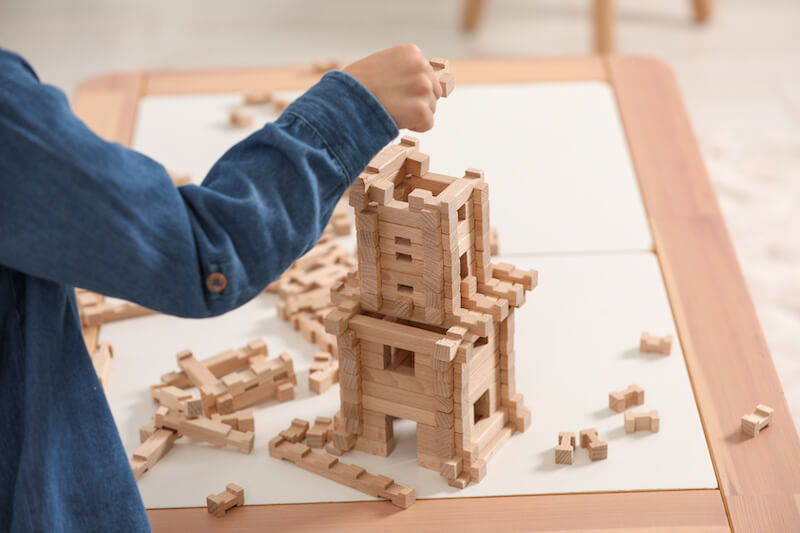Autism and play: There are few things more accurate throughout history than the fact that kids love playing. Play is an essential aspect of a child’s development. It is natural and spontaneous, bringing children joy while contributing significantly to their emotional, cognitive, social, and physical growth.
For children with autism spectrum disorder (ASD), play holds a higher significance. Challenges in communication, sensory issues, social interaction, and repetitive behaviors characterize autism. Many behavioral difficulties neurodivergent kids face translate to playing differently from neurotypical kids, struggling with communicating during interactions or telling stories with their toys. This incorrect belief can lead some to think that kids on the spectrum don’t look forward to or benefit from playtime.
Play is a powerful tool for kids with autism, enabling them to develop essential skills, overcome challenges, and reach their unique potential. By embracing the therapeutic value of play, we can create supportive and inclusive environments where all children can participate.
At ABA Centers of Washington, we specialize in Applied Behavior Analysis (ABA) therapy, a widely used intervention for children with autism that recognizes the significance of play and incorporates it into therapy regimens to teach new skills.
Engaging children with autism in play-based activities can help them acquire essential social skills and facilitate their overall development. This article celebrates playtime and explains why autism and play go hand in hand.
1. Play Benefits
Play is crucial for the development of various skills in children. It fosters cognitive growth by enhancing problem-solving abilities, creativity, and imagination. When kids participate in imaginative play, such as engaging in make-believe scenarios or pretending to be characters, they develop crucial cognitive skills, including planning, symbolic representation, and abstract thinking.
Play is a self-motivated and enjoyable activity characterized by flexibility and creativity that children join for pleasure, learning, and exploration. Play can take various forms, including imaginative, physical, constructive, and social. Each type of play contributes to different aspects of a child’s development.
Play also plays a significant role in emotional and social development. Through play, children learn to interact with others, negotiate, share, take turns, and develop empathy. They practice social skills, such as understanding emotional cues, body language, and facial expressions. Play enables children to express themselves while developing emotional regulation and coping mechanisms for challenging situations.
Furthermore, play improves physical development by focusing on fine and gross motor skills, coordination, and body awareness. Running, climbing, and jumping helps children develop their balance, muscles, and coordination. Solving puzzles or building with blocks enhances hand-eye coordination and fine motor skills.
2. Play and Developmental Milestones
Play establishes developmental milestones in children. Babies engage in exploratory play during infancy, investigating objects, sounds, and textures. This form of play helps them develop spatial awareness and sensory integration skills.
Children engage in pretend symbolic play as they grow. This type of play involves substituting an object’s purpose and creating imaginary scenarios. This crucial milestone indicates the development of abstract thinking, language skills, social understanding, and problem-solving.
3. Autism and Play
Neurodivergent children are unique and exhibit distinct characteristics in play behavior. These arise due to the sensory processing, communication, and social challenges they experience. Understanding these particularities can show how kids with ASD benefit from play.
Solo Play
Children with autism often play by themselves, known as solitary play. They may prefer stereotyped or repetitive behaviors, focusing intensely on activities and specific objects. This type of play can involve repetitive movements, lining up toys, or spinning wheels rather than pushing a car.
Self-directed play behaviors serve many purposes for children with autism, like creating a predictable environment with no unwanted sensory interference. Kids with ASD also develop intense interests in objects, activities, or specific topics. Their solitary play may revolve around these focused interests, allowing them to explore and deepen their knowledge of the subject.
Kids with ASD sometimes struggle to interpret social cues like nonverbal communication, body language, or facial expressions. Their preferences mean remaining outside a group as they don’t always get the most out of playing directly with other kids.
Symbolic Play
Symbolic play, also known as pretend play or imaginative play, is an important developmental milestone that allows children to use actions and objects to represent something else. It requires creating and acting out imaginary scenarios, engaging in make-believe play, and using objects creatively and symbolically. This development usually happens in kids around 2 to 3 years old and continues throughout childhood.
However, children with autism spectrum disorder (ASD) often face challenges in engaging in symbolic play. They struggle with telling stories, playing pretend, or imaginative thinking in general. They may need coaching to grasp the abstract nature of objects, for example, failing to understand that a cinderblock can be a chair or a stick can be a sword.
4. Play and ABA Therapy
In ABA therapy, play is often used as a naturalistic teaching approach, where therapists incorporate play-based activities to target specific goals. Therapists create a play environment that encourages learning by utilizing the child’s motivations and interests. They may use games, toys, and make-believe social scenarios to teach language development, social skills, and problem-solving.
ABA therapists employ prompting, reinforcement, and shaping strategies to guide children through play-based activities. By breaking down complex skills into manageable steps, therapists can gradually teach children with autism new skills. For example, if the goal is to teach turn-taking, therapists may use a game where the child takes turns with the therapist or a peer. A child can learn concepts and generalize them to other contexts through positive reinforcement, receiving a reward for each healthy action.
ABA therapy is the gold standard therapy for children with autism. It focuses on teaching and reinforcing healthy behaviors while reducing challenging behaviors. Play is an integral part of an ABA regime to engage children and teach them meaningful new skills.
5. Encouraging Play
Below are some simple techniques for parents that ABA therapists use to encourage play:
- Visual Supports: Visual prompts, visible schedules, or social stories can assist children with autism in understanding the sequence of play activities, social rules, and expected behaviors.
- Structured Play Activities: Introduce structured play activities with clear rules and expectations. This technique can help children with autism understand the play context and develop appropriate social skills, such as following instructions, taking turns, and sharing.
- Facilitate Shared Interests: This is a commonsense principle, kids like playing with kids who hold similar interests. You engage and motivate your child in interactive play by determining which peer has an overlapping interest.
- Peer Modeling & Support: Lead the way during play. If you act as a mentor and model during play sessions, your children will better understand how to navigate social interactions.
ABA Centers of Washington, ABA, Autism and Play
At ABA Centers of Washington, we offer top-of-the-line ABA therapy for anyone with autism seeking growth. Our board-certified experts individualize our care to ensure every child shores up their weaknesses and capitalizes on their strengths. Play therapy is central in ABA for teaching clients new abilities and safeguarding success, independence, and joy.
Call (877) 554-0710 or reach out on our website for a free consultation.








